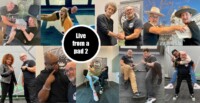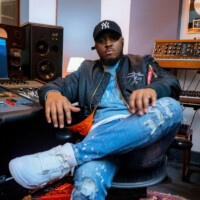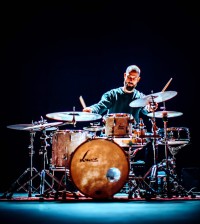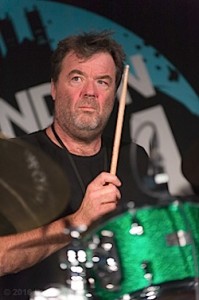 Bear with me as I self indulge for moment – 28 years ago I made the decision to move from my home town of Brighton to the bright lights of London with a dream. When I got here looking for work, Ian Thomas was just one of the names being mentioned all the time. Ian had made the move two years before me but had already established himself as one of the first call drummers in London. Ian was doing everything from a jazz gig at Ronnie Scotts, touring with George Michael, TV jingles, block buster movies sessions, pop sessions, West End musicals… you name it, Ian was doing it. When I first got my West End London residency gig at “Talk of London”, the band leader would always ask for Ian Thomas to be my dep, although he was always to busy to do it…
Bear with me as I self indulge for moment – 28 years ago I made the decision to move from my home town of Brighton to the bright lights of London with a dream. When I got here looking for work, Ian Thomas was just one of the names being mentioned all the time. Ian had made the move two years before me but had already established himself as one of the first call drummers in London. Ian was doing everything from a jazz gig at Ronnie Scotts, touring with George Michael, TV jingles, block buster movies sessions, pop sessions, West End musicals… you name it, Ian was doing it. When I first got my West End London residency gig at “Talk of London”, the band leader would always ask for Ian Thomas to be my dep, although he was always to busy to do it…
Although Ian is only a couple of years older than me, he was one of the drummers I always respected and admired. He really can really do it all, but is too humble to admit it!
We got together to drink tea and talk drums…
The first thing I’d like to talk about is you relocating to London from Wales in 1984. Do you think it was important for you to do then, and do you think it’s important now in the current climate?
I think it was important for me at the time because I was only 21. I was becoming a medium sized fish in a small pond. I knew I had to come to London if I was going to be serious about being a player, and that was a pretty scary prospect when you’re brought up in Cardiff and London’s this big scary place.
We used to have holidays up here when we were kids, so it wasn’t a complete mystery to me but if you’re going to make something of this you’ve got to go to London. I remember people in Cardiff were saying “You’re mad, you’ll get the New Theatre pantomime here eventually” and this sort of thing. I thought well, that’s great but I want to be a little fish in a big pond and see how far I can get.
I decided I’d give myself five years and see how I got on, and if it didn’t happen after five years I’d probably try and do something else. I was that in love with drums and music that I wanted to try and make the most of it.
Do you think when that five years came to end, that if you hadn’t done it, would you have done something else?
I think I would have done yeah, I think I genuinely would have. The point with that is I was realistic about the way I thought it would go here. I allowed myself that length of time and if you come into London you’ve got to do that. I know people that have gone to New York and LA and probably London as well who have come with enough money to last maybe two weeks and wonder why it didn’t happen for them. I think you’ve got to be realistic about it.
When I came to London I was lucky enough to find a small bedroom in a house of musicians and I went to sign on; I was signing on to have my rent paid, I didn’t have any gigs or know anybody but it’s the right age to do that too of course.
For me it was the only thing to do, I didn’t know anybody or have any gigs so then I started going to NYJO (National Youth Jazz Orchestra) which was really scary and when I look back, it was quite brave what I was doing really, but I was so blinkered and needed to make it work that there was no way I’d have done anything else.
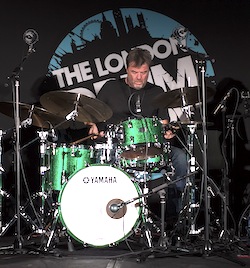 Did you have any contacts in Wales that said “Right, you’ve got to do this, got to do that” or did you literally just come into London and go right “Where do I go?”
Did you have any contacts in Wales that said “Right, you’ve got to do this, got to do that” or did you literally just come into London and go right “Where do I go?”
I had some really tentative things, not very much though. I knew about NYJO because I’d been there already when I was younger, just travelling up from Cardiff and I knew that there were a bunch of contemporaries there who I still know to this day, some of my best friends.
I also realised that, in those days there were no mobiles so you had to have a London number. I moved to Wimbledon and 01 946 9038 was the number, and to have that and be able to give that number out to people who were asking was the holy grail back in those days because then you would be a dep who was in London you know. It was a big deal as I’m sure you remember.
That helped a lot and I just went to jam nights, went to the old 606 club and would sit in. I was talking to a pupil about this the other day; I used to go red all over and feel sick and didn’t want to be there really, but forced myself to go there and it would be the Jim Mullen Quartet with Jeremy Stacey on drums and then Jim would say “Hey Ian, come and sit in” .
Did you used to get a look in with NYJO? I know that this would have been the time the young Mike Smith, Mike Bradley and Mark Mondesir would have been there
Yeah, to be honest with you, the reason why my reading got to any sort of reasonable level was because of Mike Smith. There would be some weeks where I wouldn’t play but I didn’t care because it was like an education sitting behind the drums when a brand new chart was handed to Mike and seeing the way he sight read it and the way that he executed the phrasing, and everything was like going to school really.
It was that standard of playing that I realised that I had to get my reading to, which it wasn’t at the time really. Mike was phenomenal and that’s what brought me up by the seat of my pants really, so going there, whether I played or not, I was always learning.
I do see similarities between Bill and the teacher from Whiplash. I studied with Kenny Clare and he wouldn’t let me go to NYJO because of the way Bill would treat drummers!
I’ll tell you what he did to me on the first time I went; I was absolutely s*****g myself. I got up at 5:30am and left Cardiff to go to City Lit just off Drury Lane. I got there at about eight in the morning or something like that, horribly early just wandering around this place, wracked with nerves and everything else and eventually saw everybody. There were all these cliques, all these session guys, little tiny Nigel Hitchcock.
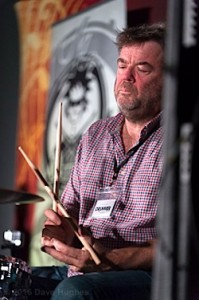 So I sat in and he said “We’ve got a drummer here from Wales, Ian you play the next one” so I got up and sat on the kit, looked at the part and it was 10 bars rest and went “1, 2, a 1,2,3,4” counted the trombones in and there must have been about fifteen trombones there, some of who could play and some who couldn’t. He counted them in and it was slowing down and slowing down and I didn’t know what to do, so I just came in at the tempo and he said “Stop… stop, stop, stop, stop, stop! Drummer, I know they slowed down, it’s your job to remember the tempo I counted in and you come in at that tempo. So we did it again and I just tried to remember the tempo and tried to keep my nerve and come in right and got away with it.
So I sat in and he said “We’ve got a drummer here from Wales, Ian you play the next one” so I got up and sat on the kit, looked at the part and it was 10 bars rest and went “1, 2, a 1,2,3,4” counted the trombones in and there must have been about fifteen trombones there, some of who could play and some who couldn’t. He counted them in and it was slowing down and slowing down and I didn’t know what to do, so I just came in at the tempo and he said “Stop… stop, stop, stop, stop, stop! Drummer, I know they slowed down, it’s your job to remember the tempo I counted in and you come in at that tempo. So we did it again and I just tried to remember the tempo and tried to keep my nerve and come in right and got away with it.
Within the generation I joined at NYJO, that there was a lot of burning going on in those days. You used to see people come to the band on all instruments and you’d never see them again. That was something that in my generation which was John Smith on piano, Don Richardson on Bass, myself, Chris Watson on guitar; we kind of decided we weren’t going to be like that. We made it our passion to be very warm to people who came and we realised that you could get burned and never come back.
I managed to stick to it [NYJO] and I’ve got to say it was never really my chair. I mean I use to go and sometimes I’d play percussion really badly and I did a few gigs on kit but while I was there it was always really Mike Smiths’ chair or Mike Bradley’s.
I know you used to suffer quite a bit from your nerves. Do you still suffer now?
I think recently I’ve talked about nerves more at my clinics. I talk about it now as its really important for younger players to know that if they think that somebody like me is in anyway different; which is what I used to think about people like Vinnie or Gadd and these people, that they were somehow superhuman and that none of these things or elements that were troubling me like nerves, or who was in the audience, or whether I’d play it well or not, effected these people, that it was an unusual thing.
Now I’ve met these people and I know that that’s not true and everyone is kind of the same. Also a part of caring about what you do so much brings nerves with it. I think it’s important to talk about it and it’s almost like a taboo subject in a sense, and so I took this step of being honest about it.
Do you find you get nervous, for example when you’re touring with Mark Knopfler or Eric Clapton and you’re doing a long tour and you know what’s going to happen? Do you find you get the same nerves as when you’re doing a gig you’ve never done before or are they different?
I think they’re different. The one really big advantage for any gig like Eric or Mark or whomever is you have a long rehearsal period, so the nerves are dealt with by knowing the music.
I was talking to my nephew who’s doing all his essays for his exams and he said “As long as I’ve done my homework I feel good, I feel really confident about it” and I said that’s the same as if I’ve got to go and do a gig and I’ve learnt the stuff and I know the material, I can have a level of confidence. Or if I know I should have done more wood shedding on stuff and I haven’t, which is very rare of course, but if you’re not prepared for it then that’s not going to help your nerves. So I think being aware of nerves and preparing properly for things and learning things is so important.
In Mark’s gig there was a really interesting thing that happened to me because I had come late to the gig, there were so many tunes to learn that I did cheat sheets for it. We actually had two weeks rehearsal, all of the band had toured before so not that many new tunes for them, but for me there were about 45 tunes to learn, so I cheat sheeted them all and had them all there. I didn’t put a foot wrong but the manager came up to me and said “When are you going to get rid of those charts and music” and of course he was right. So I set about trying to get rid of them.
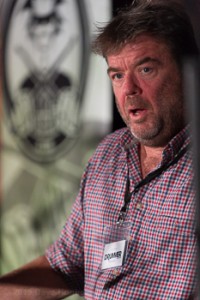 This happened with me in a couple of bands, with Hamish Stewart’s band and a couple of other bands that I do regularly, but the minute I got rid of the charts it became a completely different experience, a much more musical experience, a holistic experience because you actually know the tune inside you rather than looking at a two dimensional flat piece of paper, and I realised these were just crutches and you’ve got to get rid of those as soon as possible.
This happened with me in a couple of bands, with Hamish Stewart’s band and a couple of other bands that I do regularly, but the minute I got rid of the charts it became a completely different experience, a much more musical experience, a holistic experience because you actually know the tune inside you rather than looking at a two dimensional flat piece of paper, and I realised these were just crutches and you’ve got to get rid of those as soon as possible.
That was on the first tour I did with Mark, so I’ve learnt now during rehearsals with Mark I’ll be trying to get rid of everything as quick as I can, trying to memorise things as quickly as I can, and that I think gives you confidence too. Also you come out from a different point, from a different angle.
There’s a story I tell about Pino Palladino, who has the most unbelievable memory which is part of why he’s so amazing I think, but it’s almost like if he wasn’t a bass player he could join the circus with his memory. It’s mad you know!
We were doing this Stratocaster house band thing, the 50th Anniversary of the Stratocaster and we had all these multi-artists to play for, loads of people and loads of tunes, so I did cheat sheets and I had a very thick pad of charts. Pino had nothing at all. Nothing, he didn’t write anything down, nothing at all. I remember on stage him going over to Phil Palmer and going “What’s the first chord?” actually on stage, and Phil said “It’s an F” and he’d go “Oh, cheers” and he didn’t put a foot wrong in the whole concert, not one wrong note throughout the whole thing.
Afterwards I said “How do you do that, it’s unbelievable” and he said “I’ve got my trust chops together. I trust myself. I don’t actually know where the song is going until the bar or so before but I trust myself to remember it”.
I found that really interesting and in fact since then I actually put more credence in being able to do that than sight read, because sight reading is good, but it’s an expediency. You have to do it for films or whatever but it’s much better to learn things, to feel them inside and to know them.
Bigger ears.
Bigger ears, yeah, the way that Pino always has and of course Pino does read but he spends most of his life not doing that so all he’s ever done is assimilate tunes, and I place as much value in that I think as sight reading.
Are you nervous on sessions because you don’t know what’s going to come?
I mean my nerves are not that bad and I couldn’t do what I do if it was like The Voice and other live shows that I do, but I’ve done some very high pressure, high profile things and I’m a big boy, I can deal with it but I wanted to talk about it. I felt it was important because if I’d heard somebody talk like this when I was younger, it would have been a great help, to know that Steve Gadd also has good or bad days or gets nervous would have been a great help to me!
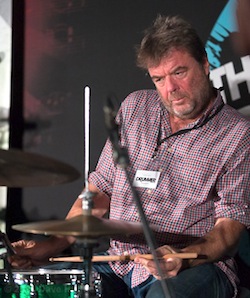 Your session work is very varied from films scores to pop jingles to jazz. How different was it when you got the first session to what you thought it was going to be like?
Your session work is very varied from films scores to pop jingles to jazz. How different was it when you got the first session to what you thought it was going to be like?
It wasn’t that much different actually, really. I read an interview with Alan Goldsmith in Musician Magazine, and he said that all he ever wanted to be was a session player and I was kind of similar really; I wanted to be a jazz player but because I loved all sorts of different music and because I’d got into reading from a young age that was the side of the industry that was always attractive to me, so when I went on my first jingle it was pretty much as I imagined it would be, you know, and when I went on my first orchestral session I tried to prepare myself as much as I could for it. It wasn’t really that much of a surprise, I think I kind of knew how it would be and what sort of form it would take.
Let’s talk about a session drumming; every young drummer says to me they want to be a session drummer, and I always ask if they know what a session drummer is. What is a session drummer, as far as you’re concerned?
I think the term has changed now. When I hear younger guys say they want to be a session player, or they are a session player and then you say “What do you do then?” and they say “Oh, I play this type of music and that type of music and this type of music” and you ask “Have you ever been in a recording studio?” and they say “Oh, well I did once, yeah”, then you’re not a session player; in the old terminology.
What a session player means now is that you can play different styles it seems, you know what I mean? You’re a session player now if you can go play with a pop band, and then go and play in a rock band, you know, do sessions for a pop band. It’s changed it’s name so it means something else, it means something different.
When I was younger a session player was just somebody in a studio…
It was a Hal Blaine.
Yeah, it was Harold Fisher, Barry Morgan, Charlie Morgan those kind of UK guys. It was those guys that spent most of their time in the studios, recording sessions. That’s what a session player was and now it’s changed but of course now there is not as many sessions around. It’s a little bit in danger the old session thing, just because the work isn’t there.
I teach at the Academy and I see a lot of guys come here and some great players, you know, and there are lots of schools and I just wonder what are they going to do? They’re highly skilled but unfortunately the work is just not there and I really feel sorry for them.
I caught the very end of it really. When I started doing sessions, which was the late 80’s, early 90’s, even then everybody was saying that the golden days had passed. There were a lot more studios open in those days, and lot more stuff on the TV, drama series and variety series and everything had a band on it. Every advert had a band on it, and you hardly ever hear an advert now with real musicians on it.The scene has completely changed and I feel really sorry for them that that opportunity is not really there.
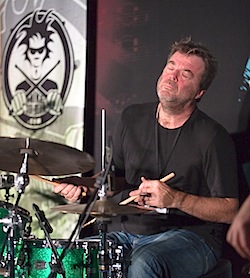 What do you think are the skills you need? Say you’re going to do a Hans Zimmer session, what do you need?
What do you think are the skills you need? Say you’re going to do a Hans Zimmer session, what do you need?
If you’re going to do a Hans Zimmer session you need to not be scared of reading, you need to have a base level of reading that is high. You’re rhythm recognition needs to be second nature to you and then your interpretation. You need to get your reading to that standard so that you can look at a chart and make decisions and not be tied into what is written necessarily, to be able to sight read and have your ears open so you’ve got the best of both worlds.
So for instance, if there is a bar of a groove and then 7 bars, you don’t count 7 bars, you feel it and you scan the part. I can scan a part and say “Oh, where’s the to coda sign, I can see this here but you haven’t actually got a marking” “Oh yeah, sorry, the copyist missed it off” and it’s experience like that you see the mistake before you even get there you know.
You scan a chart to see that it all makes sense, that’s the first thing you do and then you scan it so see what’s the feel, what’s going on and all this stuff is very instantaneous you know, it’s what you learn.
Then of course, be open to suggestions from the composer and listen; at the end of the day a chart is a way of getting it over to somebody very quickly, but usually you get a chance to hear the music and it’s the music that tells you what’s what.
But you’ve done all the hours working with a click, listening to all sorts of music, working on your reading…
And also I’ve done six summer seasons, I’ve worked on the cruise ships, played on the Talk of London and done countless functions and all of that is in my pot, it’s all there.
I was on session for George Fenton who is a great writer and a great guy, and I remember being on a film for him and I had a chart which was 3 /4 with just three slashes in it and repeat bars, and I asked “George, what sort of thing is this?” because if you get a chart like that you have to ask that question because there is no information and he said “Oh, it’s a Veleta” and that was it, that’s all he had to say.
I’ve done all that, I know a Rhumba and a Foxtrot; it was all part of my training when I was a boy.
I think what you’ve said there is so important, I think a lot of the younger people you’ve talking about i.e. at music colleges etc don’t know that, and it’s so important.
I think they don’t, but even that you see, in my day when I grew up in South Wales there were a million social clubs and I played in them from 14 you know and summer seasons, they’ve gone; ships still exist…
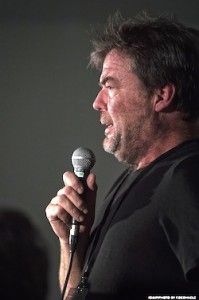 My issue with students about this is that you can find that music. We were fortunate enough that we did summer camps playing all that stuff, and working with an old band leaders, and if you didn’t have the exact tempo for an old time waltz you’d get things thrown at you. But those gigs aren’t happening now, but you can still find that music, knowledge is out there on the internet, which we never had, we didn’t have that information except on the band stand.
My issue with students about this is that you can find that music. We were fortunate enough that we did summer camps playing all that stuff, and working with an old band leaders, and if you didn’t have the exact tempo for an old time waltz you’d get things thrown at you. But those gigs aren’t happening now, but you can still find that music, knowledge is out there on the internet, which we never had, we didn’t have that information except on the band stand.
No we didn’t but we learnt on the gig and that was the difference, I think quite a big difference. I remember this album when I was a kid, I can see the album cover now of the dance album I used to learn what a Rhumba was and a Beguine and a Samba, the difference between a quickstep and a foxtrot and my teacher tested me on those things. He’d say “Right play me the tempo of a foxtrot” you know and I’d think of the tune “Ok, roughly about… ok” and a quickstep? Think of Match of the Day…
Also, I feel that in our day… sounds like I’m being a real old fogey… but in our day, you had to go looking for it a lot more. It’s so immediate now it’s almost like overload. I remember if you ordered the Buddy Rich album in Cardiff, you’ve have to wait a couple of months for it and you got the album and it was like “Wow! ” and you’d got to bed at night sleeping with it on the pillow you know!
Well, it’s funny you should say that as it brings me onto my next question; what do you think one of the major albums is that inspires today?
That’s hard that is! I remember the Buddy Rich album I had when I was about 12 which was an album called “Straight No Chaser”, which was a smaller band with Mike Mainieri, and even if I put that on now I can still sing all the solos of the playing. It was a real seminal album for me, that’s what really turned me on when I was 12, so that would definitely be one of them but since then there are so many in so many different areas of music .
Carrying on from that, can you give me five songs or five albums that you have played on, that you’re most proud of?
I think I’d have to say the live album from Madison Square Garden with Steve Winwood and Eric Clapton, that was an amazing experience. I think the two George Michael albums; they were such a big deal for me at the time, “Faith” and “Listen Without Prejudice”…
I find it difficult because I don’t really like listening to my own playing.
Well, changing the question slightly then, what were maybe the most important parts or chapters in your life; would Seal come into that?
I think Seal does come into that, yeah. I only joined Seal after the first album, the first massive one and I toured that. There was a live DVD from The Point that we did that was pretty seminal for me and then I played on “Seal 2” and “Seal 4”. That was important, it was a great experience with him.
I enjoyed the Jamie Cullum album I played on, and also the BB King album, the 80th album. That was an amazing experience working with him.
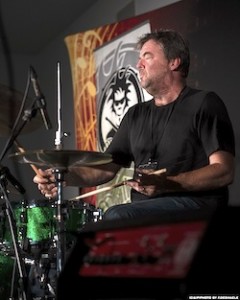 Do you think that over the years, because unfortunately we are the older generation, that your playing has changed and if so in what way?
Do you think that over the years, because unfortunately we are the older generation, that your playing has changed and if so in what way?
I think it has changed. I think maybe 15 years ago or so I started getting into groove playing a lot more and basically what that means for a jazz drummer is learning to play the space between the notes, to play less and to play, as everybody says, for the song and so on and so forth.
I think that’s changed in my playing, but weirdly enough I’m getting back into practising now which is so great and getting heavily back into rudiments and stuff like that. For example this is what I was working on last week, the four different rudiments, the four different paradiddles and triplets, which I’ve just started revisiting again and through the Dan Weiss things, trying to make music out of those so I’m getting back into a bit of chops in a way but using them in the right way. I think the essence of what I am will always be the same but now I’m adding to it.
Talking about your practising and everything else, you said you’re more into your groove playing, what’s your analogy of what good groove is? Good time?
I think it’s a consistency and a sense of flow and the knowledge that when an event happens, be it a fill or phrase or anything that happens in the music, that the river of the groove never stops, it keeps on flowing through any bar line or anything else, any event that happens.
That sense that is happening when you’re playing and that it’s your intention; I believe a lot in intention when you play, when anybody plays anything, but if it’s your intention to play and to play the groove in a way.
I talk a lot about dependence when I teach which is just the very simple idea that when two limbs are supposed to land together do land together and that they’re tight. I think that helps a lot. I’ve also got into Konnakkol which I think is an amazing thing.
Why have you got into that? Konnakkol for people that don’t know, that’s the Indian way of counting.
The way I think about it now, the way I think about grooving, and this is a means to an end in way, but I think of the four limbs and a fifth one being your internal clock and I think the Konnakkol really helps, especially with the “takadimi, takadimi, takadimi”. If you’re audibly saying that and linking your limbs up to it, and I’m paraphrasing Peter Erskine, then you’re presenting this big homogenised four limbs and the fifth with your internal clock. You’re saying “this is where I think the time is” and everything is linked into your time playing, all your limbs are agreeing with each other, they’re married to each other and also married to your internal clock. When you start to get that going on, I think that’s when your groove really starts to come together.
Are you studying that?
I am! I’m very new to Konnakkol, like a little child in a playground really and don’t know much about it but I know it’s an incredible thing, a fascinating thing that’s thousands of years old. Some of the Indian structures for their tunes can last 45 minutes, and they all know all these structures which is incredible.
What I love about the takadimi [four note grouping] or takadimiti [five note grouping] is the fact that there’s no numeric value to it, which I think is really important and also the attack of the “ta”, I think really helps. When I get younger players around here, that’s what I do with them. The dependence thing, the independence thing; trying to get everything to agree with itself, all your limbs be married to themselves so that at least you agree with yourself.
I think that’s the first place where the groove starts and if it’s your intention to do that, genuinely your intention and not to worry so much about chops, but thinking more about providing that pulse, I think that comes across. I don’t think you can fake that and I think people can hear that.
It’s nice to hear somebody playing a straight ‘two and four’ and you can stay there all day playing the space between the notes. As a busy jazz player, to discover the magic in that is what you’re looking for because there is as much magic in that for me as there is in blowing everything I know within the first eight bars of a jazz tune.
In a sense, it’s nice when you play a groove gig or you play tunes it’s nice to come off thinking you haven’t said everything you know and you’ve been playing for the music, playing space and groove. That’s been your intention and that’s your first port of call for grooving I think.
I want to change direction because I know that you’ve had this, the same as every musician… I find a lot of younger kids that come into town, get an audition or two and they fail it and that’s it, they want to give up. How do you cope with rejection?
Well, I’ve got to say that that never stops really, and it can happen at any time. It’s happened to me throughout my career and I don’t think anyone is immune from it.
If you look at the parameters of what you’re dealing with when you’re dealing with superstars, it can happen that they can change their mind for whatever reason, or your face fits one minute and then doesn’t, that’s the sort of world we’re living in.
I think you’ve got to get your head around that, it’s tough but you’ve got to realise not to be put off what your dream is to keep going. Again I think it’s good to talk about this because we’ve all been through it and always will. It’s a part of being a musician that one day you’re top of the heap and the next day you might not be.
It’s interesting you say that though because my Dad who encouraged me to do this as a business was a builder and it would have been easy for me to walk into the family business, but he always said “Go through life doing what you want to do and not doing something for the money, and if you can turn this into a way of making a living then you’ve won the lottery”.
I definitely think so, but I think it’s important that there will be rough times, good times and bad times and there will be times of loads of work and times of no work, and it still happens to me now. This is what I’m trying to dispel with the nerves thing and this sort of thing and with being disappointed; being fired on stuff – that’s difficult to take and out of your control. It still happens to everybody.
I also say to people that you can’t beat that stuff – you have to put up with it. However, if you lose that love of making music then that is the time to get out.
I think that’s the only thing that saves us all really, as Pat Metheny calls it, the “opium of musicians” you know because inside me is a genuine love for it, it’s not painted on for any reason for gain, it’s a genuine love for it and I think you’ve got to have that, it’s that you never lose.
Interview by Mike Dolbear
May 2016

